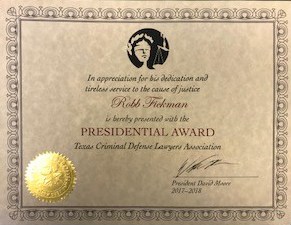Assault and aggravated assault are two terms you never want to hear in relation to your name. But if you find yourself in that position, understanding the difference is key to knowing what you’re up against. Assault charges can range …

We Take Your Texas Family Violence Charges Seriously
Being arrested and charged with family violence, also called domestic violence, can be a scary experience. After all, your freedom, family, and reputation are on the line.
That is why you need Fickman Criminal Defense on your side. With four decades of experience practicing Texas criminal law, Robert J. Fickman offers you a chance to defend yourself against family violence charges successfully.
The penalties for family violence in Texas can be steep, which makes it even more vital to find an experienced attorney to guide you through the criminal justice system.
Defining Family Violence Charges in Texas
Family violence is an issue that the criminal justice system addresses through criminal charges against the perpetrator. You can be charged with this kind of crime if you assault a member of your household or family.
Assault under Texas law is classified as intentionally, carelessly, or deliberately causing or threatening to cause bodily injury to a member of your household or family. Also, making physical contact with someone in a way they consider offensive or provocative is considered assault.
Who exactly qualifies as a member of your household or family in Texas? It seems like the answer should be clear and obvious, but the law in these kinds of situations is very specific.
For a crime to rise from an assault charge to a family violence charge, it must be perpetrated against someone who falls under the following categories:
- Anyone you are related to by marriage or by blood
- Anyone to whom you have been or are currently married
- Anyone with whom you share a child
- Foster children and their foster parents
- Anyone with whom you share a dwelling
- Anyone with whom you were or currently are in a dating relationship
Common Domestic Violence Charges That Texans Face
Some common charges are associated with family violence in Texas. It is important to note that crimes involving violence against someone legally a member of your household or family will carry a more significant penalty than the same act committed against someone not a member of your family or household.
Common types of charges include:
- Assault
- Interference with an emergency call
- Stalking
- Terroristic Threats
Some special types of charges will only be charged in a setting involving family violence, including:
Aggravated Assault with a Deadly Weapons Against Family Member
This occurs when someone assaults a person in their family or household with a deadly weapon or they inflict serious bodily injury on a person. It is considered a first-degree felony.
Second Domestic Assault and Subsequent Domestic Assault
If a person has a prior conviction for an assault against a family member, the charges will increase to a third-degree felony.
Assault by Strangulation
If pressure is applied to the neck of the household/family member, or if their mouth or nose is blocked during the course of the assault, then it is a third-degree felony for a first offense, second-degree for any after that.
Penalties for Texas Family Violence Crimes
The types of crimes a person is accused of in a family violence case will inform the penalties they face if convicted. The offense levels and their penalties include:
Class C Misdemeanor
This is charged when there is offensive or provocative physical contact or threats. The penalty is often a fine of as much as $500.
Class A Misdemeanor
This may be charged if bodily injury is done to a family member or a household member during the incident. If convicted, you can face up to 12 months in jail and be responsible for fines of as much as $4,000.
Third Degree Felony
Assault and assault with strangulation are felonies when bodily harm is caused against a family or household member. You can spend up to 10 years in prison if convicted of this level of offense and be made to pay fines of as much as $10,000.
Sentencing Alternatives
If there is a knowledgeable attorney at your side to help guide you through the criminal justice process, you may be able to work with prosecutors to obtain alternative sentences to incarceration.
Sometimes, a first-time offender can have a “deferred adjudication,” resulting in the dismissal of any charges against them after they meet the requirements set forth by the court. This may mean probation instead of time behind bars, allowing you to stay in the community as you fulfill the terms of your probation instead of going to jail or prison.
Protective Orders: Another Family Violence Consequence in Texas
In many family violence cases, the victim may seek a protective order against the person accused of harming them. A protective order prohibits contact between the defendant and the victim, meaning you may have to move out of your home – and you may not be able to see your children.
Violation of a protective order will result in another Class A misdemeanor on your record, which can send you to jail for up to one year and make you responsible for paying a fine of $4,000. If you repeatedly break the conditions of the order, then you may face charges for a third-degree felony, which can send you to prison for up to 10 years.
Other Domestic Violence Restrictions Texans Must Consider
Not only do you face time behind bars, protective orders, and fines when you are convicted of a family violence crime, but you also face other conditions such as firearms restriction. This means that you will lose the right to possess a firearm permanently. You may be able to regain these rights after a conviction but only with the help of an experienced attorney.
Do Not Delay: Call An Experienced Texas Family Violence Attorney Today
You need a lawyer if you have been arrested for family violence or another type of assault charge. Let Fickman Criminal Defense help you get the representation you deserve to protect your rights throughout the legal process.
Contact us today by phone at 713.655.7400, through email at rfickman@gmail.com, or simply complete our free online case consultation form.
A SUMMARY OF CRIMINAL DEFENSE ATTORNEY ROBERT FICKMAN’S CREDENTIALS
- Robert Fickman has been a criminal defense attorney in Houston for 40+ Years.
- Robert Fickman has handled and won many cases in State and Federal Court.
- Robert Fickman has argued many cases before the Fifth Circuit Court of Appeals.
- Robert Fickman has had an AV Rating (the highest rating) with Martindale Hubbell for over 20 years.
- Robert Fickman has been named a “Texas Super Lawyer” since 2015.
- Robert Fickman is well-respected by his peers and has received numerous awards.
- Robert Fickman was the President of the Harris County Criminal Lawyers Association (HCCLA) from 2006-2007.
- Robert Fickman is a past Board Member of the Texas Criminal Defense Lawyers Association (TCDLA).
- Robert Fickman serves on the HCCLA and TCDLA Strike Forces, where he is called upon to come to the aid of other criminal defense lawyers.
- Robert Fickman is an outstanding public speaker. Robert Fickman was on the National Association of Criminal Defense Lawyers “Best of 2010 Speakers,” “Best of 2014 “Speakers Disk,” and “Best of 2022 Speakers.”
- Robert Fickman was named “Mr. Declaration of Independence.” in the Texas State Bar Journal for his volunteerism.














